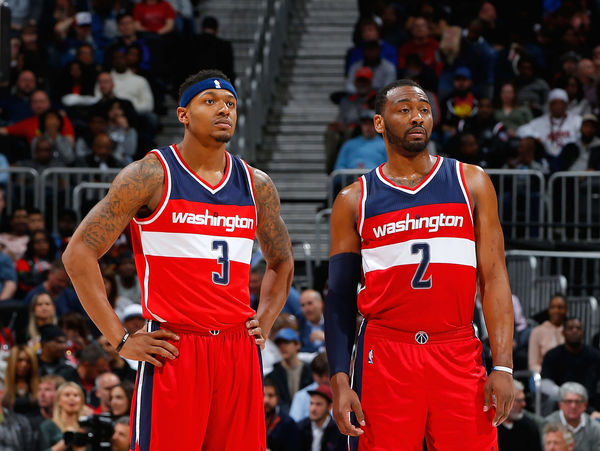Kevin C. Cox/Getty Images
At the moment, the discord between John Wall and Bradley Beal is not readily apparent. The trash-talking night owl (Wall) and the quiet churchgoer (Beal) stroll out of the showers and into the locker room chatting amiably. Wall might be swaddled in red towels while Beal has wrapped himself in blue ones, just as Wall might prefer wireless cans while Beal listens to his pregame playlist through earbuds, but right now those are the only visible points of contention.
Earlier this same evening, though, their disconnect permeated the air of the Verizon Center in a rare blowout win over the Boston Celtics, a game that neither Wall nor Beal finished for starkly different reasons. Reasons, perhaps, that are at the heart of why their alliance has not brought both them and the Wizards the success their talent should have produced by now.
Strictly looking at their positions, the basketball Gods could do worse than using Wall and Beal as the blueprint for a point guard-shooting guard combination. They are nearly identical in size (6'4" and 6'5") and have the speed, size and strength to be top-shelf two-way players. Both can move without the ball and are sure-handed with it. Both attack the rim and shoot from range.
There is also a healthy divergence in strengths. Beal is the team's best long-range shooter (though he is struggling this season) while Wall is first and foremost a playmaker, capable of getting all the points he needs—thanks to his whippet quickness—in transition alone.
"That's a nasty backcourt," says a rival Eastern Conference assistant coach. "I'm a big Beal fan and Wall has always caused us problems. They should be better than [Rajon] Rondo and [Dwyane] Wade when those two were in their prime. But they haven't lived up to expectations."
Indeed, they haven't. After a coaching change and an offseason controversy inspired by Wall admitting he and Beal don't always get along on the court, the Wizards find themselves with four wins and at the wrong end of the Eastern Conference dog pile, looking up at less talent-laden teams such as the Orlando Magic and Brooklyn Nets.
Beal and Wall are in their fifth season together, and while their potential once had them in the conversation with the likes of Stephen Curry and Klay Thompson or Kyle Lowry and DeMar DeRozan, their reality has left the Wizards trying to figure out if their $212 million tandem will ever fully mesh.
✦✦✦
NBA history is littered with examples of talented combinations that never realized their potential, or, worse, had to be disbanded. For every Magic and Kareem or Michael and Scottie, there are a dozen Shaq and Pennys or KG and Starburys. Signs of discord, invariably denied or downplayed at the time, later prove to be the stench of an internal dumpster fire.

Scott Brooks navigated the sometimes complicated relationship between Kevin Durant and Russell Westbrook for seven years with the Oklahoma City Thunder. (Photo: Stephen Dunn/Getty Images)
Kevin Durant and Russell Westbrook are the latest example of two seemingly compatible superstars who ultimately parted ways. They did so one season after Billy Donovan replaced Scott Brooks as head coach. How much Brooks' departure had to do with KD jumping ship can be debated, but he devoted a great deal of time to his stars' relationship, hammering them with three principles: a) respect each other, b) appreciate each other's talent and c) enjoy each other's success.
"It was a work in progress every year," Brooks says now. "There was more scrutiny there. There were more people who wanted [Durant and Westbrook] to be separated. I obviously had to say some things in coach talk to protect the situation, but it wasn't even close to what people were saying it was then. I did a great job of controlling the spirit of our team and it changed last year for whatever reason."
Durant and Westbrook, however, never made the admission, as Wall did, that he and Beal have a tendency to "dislike each other on the court."
Since Wall's comments aired in late August, both he and Beal have sat down multiple times with various outlets to insist their squabbles are the kind brothers, not jealous teammates, have. For Beal, who has four biological brothers, Wall most reminds him of the brother closest to him in age and temperament—his twin, Bryon:
"He doesn't care if he's wrong a million times, he's still right," Beal says. "He accepts his criticism, but he's strong in what he believes in. I'm the same way."
Wall, though, assuredly didn't grow up the way the Beal boys did. His father spent John's childhood locked up for armed robbery and a biological half-brother, John Carroll Wall Jr., has, according to an ESPN.com report, spent a good part of his life behind bars as well.
Whether it's the difference in their early life experiences or simply a difference in pain tolerance, team sources say a point of conflict is their respective approaches to playing hurt.
When Beal drove and fell in the third quarter of the win over the Celtics and pushed himself, still sitting, off the court, the collective thought bubble arising in the Verizon Center was familiar: "Not again." He stayed down for several minutes before walking to the locker room, done for the night with what was diagnosed as a strained hamstring.
Beal's early departure was nothing new. Over his first four seasons, he played in 247 out of a possible 328 regular-season games. His injuries have been equal parts lingering and odd, the most pervasive a resurfacing stress reaction in his right shin. But he's also missed time with a strained pelvis.








